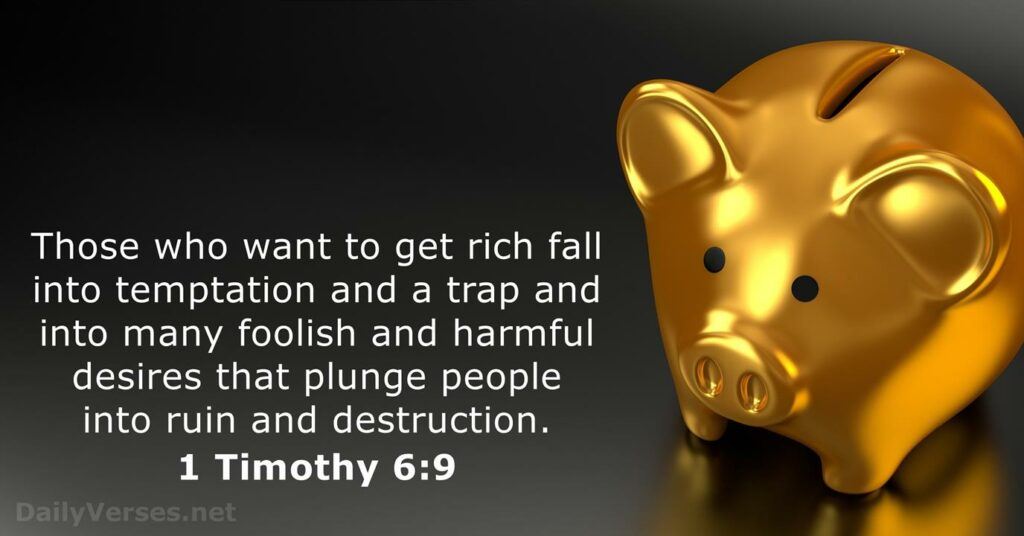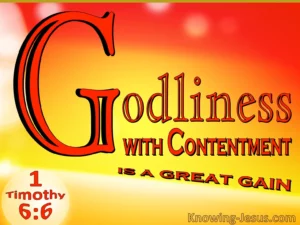Money—we all have different opinions and feelings about it. However, no matter our feelings or opinions, money is an essential element of our lives. Therefore, it is no wonder that the Bible addresses money as much as it does.
Money and the Bible
There are approximately 2,000 Bible verses about money and possessions, and there are many more subtle variations concerning them. So, what is the relationship between money and the Bible? The purpose of this article is to illuminate that relationship.
What is Money?
Money is a medium of exchange that can be used to purchase, pay off a debt, and even be traded. It is a worldwide item, and its medium of exchange, its value, differs from country to country.
Money is a more convenient way to obtain goods and services than trading items. What would we trade when we visit the supermarket, drug store, beauty parlor, or barbershop?
The thing to remember about money is that it is amoral. It does not act on its own. Therefore, it can do no right or wrong, commit any crimes, or do good deeds. Money is only a tool that accomplishes what the possessor wishes.
It is too often said: “money is the root of all evil.” However, as the Scripture accurately states: “For the love of money is the root of all evil…” (1 Tim 6:10). More on this later.
What Does the Bible Say about Money?
The Bible records 38 Of Jesus’ parables; 16 nearly half address money and possessions. Close to 25% of Jesus’ words address stewardship. To sum up, there are approximately 2,000 Bible verses that address money and possessions.
The first and foremost thing to recognize concerning money and stewardship is that God owns everything.
Let’s look at what God said to the Israelites in Ex 19:5
5 “Now, therefore, if ye will obey my voice indeed, and keep my covenant, then ye shall be a peculiar treasure unto me above all people: for all the earth is mine:”
Hag 2:8
8 “The silver is mine and the gold is mine,’ declares the Lord Almighty.” NIV
Therefore, it is vital to understand that we do not own anything. It is God who owns, and we are managers, stewards of what He blesses us with through His grace. While we are to manage the money we accumulate, we are not to love money and seek it with a burdensome desire.
1 Tim 6:9-10 says:
9 “People who want to get rich fall into temptation and a trap and into many foolish and harmful desires that plunge men into ruin and destruction. NIV

10 For the love of money
is a root of all kinds of evil. Some people, eager for money, have wandered from the faith and pierced themselves with many griefs.” NIV
When we seek to get rich, we open ourselves to temptations that will lead to our ruin.
Recognizing and accepting God’s ownership ship of all and our duty of stewardship is the heart of understanding Biblical stewardship.
The next thing to recognize regarding what the Bible says about money is that stewardship and discipleship go hand and hand. There is a link between faith and stewardship. Our faith, if it is genuine, will determine how we approach money and possessions.
Matt 6:24
24 “No one can serve two masters. Either he will hate the one and love the other, or he will be devoted to the one and despise the other. You cannot serve both God and Money. NIV

If we serve Christ and are his true disciples, we cannot allow ourselves to become influenced by the pull of money to pursue wealth and selfish pleasures; that would be serving money. Understand that we cannot serve both.
The choice is ours, and what we choose determines where our heart is as Jesus said in Luke 12:34: “For where your treasure is, there will your heart be also.”
Choosing riches can keep us from entering Heaven. Mark 10:23-25
23 And Jesus looked round about, and saith unto his disciples, How hardly shall they that have riches enter into the kingdom of God!
24 And the disciples were astonished at his words. But Jesus answereth again, and saith unto them, Children, how hard is it for them that trust in riches to enter into the kingdom of God!
25 It is easier for a camel to go through the eye of a needle, than for a rich man to enter into the kingdom of God.
Being rich wasn’t this man’s problem; prioritizing his riches over God and His kingdom was his problem as it is for most of the rich. They choose money for their god.
As Disciples of Christ, we must keep our hearts in the right place. It is very easy to fall into the trap of placing our hope in money. This false hope is especially true for those individuals who have an excessive amount of it. Because they either forget or fail to acknowledge where wealth really originates. We are warned against this in the Scriptures.
Deut 8:17-18
17 “You may say to yourself, “My power and the strength of my hands have produced this wealth for me.” 18 But remember the Lord your God, for it is he who gives you the ability to produce wealth”…NIV
As Disciples of Christ and good stewards, it is vital to keep these things in their proper progression; God is the source, and money is the resource. We must worship the creator and not the creation. For more on God as our resource, please read the article, God: the Source of all things, on this website.
The next point the Bible addresses regarding money is contentment.
In the world we live in, we are encouraged to always strive for more, for bigger and better: to have more money, a bigger house, a better car, etc. We are constantly inundated with advertising that entices us to pursue more and better material things. However, instead of making us feel better, it only leads to discontentment in the long run.
Discontentment is an insidious sin that leads us to covet more or something different, yet it leaves us unfulfilled and disappointed in the end. The Scripture reads in Eccl 5:10:
10 “Whoever loves money never has money enough; whoever loves wealth is never satisfied with his income. This too is meaningless.” NIV
The wise King Solomon (the author) discerned that those who obsessively seek after money never find the happiness it assures. Excess riches attract slackers and thieves, as well as insomnia and anxiety, and ultimately end. It does not matter how much an individual may earn. If they attempt to find happiness by accumulating wealth, they will never have enough.
Living in discontentment can lead to unwise decisions and behaviors such as taking on unnecessary debt, being unfaithful to a spouse, or making rash decisions at work to get ahead.
In the verses prior to this passage, a rich young ruler asked Jesus what was required for him to inherit eternal life. Jesus told him to give his possessions to the poor, follow Him, and he would have treasure in Heaven. However, the rich young ruler left in a state of sadness. He chose his possessions over the kingdom, which led Jesus to utter this response.
Contentment, on the other hand, is learning to be completely satisfied in Christ regardless of whether we have a little or a lot of money.
Contentment is not an easy goal to attain, but we can be contented. It is something we have to strive for with the help of the Holy Spirit.
Contentment brings blessings as 1 Tim 6:6 reads:
6 But godliness with contentment is great gain.
Godliness is the reality and power of a real bond with God. Godliness does not come and go with the temporal nature of material wealth; godliness, with contentment, is
the wealth, regardless of an individual’s money and possessions. Contentment is peace. Godliness allows us to be satisfied with what we have materially and our relationship with God.
Paul expressed this beautifully in Phil 4:12-13
12 I know what it is to be in need, and I know what it is to have plenty. I have learned the secret of being content in any and every situation, whether well fed or hungry, whether living in plenty or in want. 13 I can do everything through him, who gives me strength. NIV
It did not matter if Paul had abundance or not much; he was able to maintain life as usual because of contentment manifested through his relationship with God and Christ. This example carries an essential lesson  for us as Christians to learn!
for us as Christians to learn!
Trust in the Lord, be content, after all, as the Scripture tells us, “But my God shall supply all your need according to his riches in glory by Christ Jesus.” Phil 4:19
The next point the Bible addresses regarding money is greed. Greed is dangerous. Just as faith is the engine for Christianity and life, greed is the engine for sin and death.
We are so warned in the Scriptures about greed. Col 3:5 reads:
5 Put to death, therefore, whatever belongs to your earthly nature: sexual immorality, impurity, lust, evil desires and
greed, which is idolatry. NIV
Greed is something we all have to deal with on some level. But the Scripture says, “put to death.” It is part of our sinful nature, and Christians must rid themselves of the things of the “earthly nature.”
At some point in our lives, we are not satisfied with how much money we make; we want to acquire more things, and we allow our desire for more money and possessions to choke out our interest in God? These actions represent idolatrous behavior.
The next money issue the Bible address is debt.
What does the Bible say about debt?
Rom 13:7-9 reads:
7 Give everyone what you owe him: If you owe taxes, pay taxes; if revenue, then revenue; if respect, then respect; if honor, then honor.
8 Let no debt remain outstanding, except the continuing debt to love one another, for he who loves his fellowman has fulfilled the law. NIV
While the Bible does not forbid being in debt, it does advise us to handle it with care, “leave no debt outstanding.” That phrase means to pay our bills. The best way to accomplish this is not to take on more than we should. Too often, we take on debt out of greed and not of necessity.
There are other numerous Scriptures in the Bible concerning money; too many to place in this one article. However, the ones that are quoted here cover the basics.
Any questions, comments, concerns, or experiences with money can be left below.
Blessings!!

What an awesome article, totally agree with everything that is said here. I love it when the truth is being spoken using scriptures that define a topic so clearly in a way where is not just pick and choose scriptures, but really well researched. Many misuse scriptures to make it sound like it’s just how they think it is, and based on their agenda and not God’s agenda. For example: When people use topics on money, they usually use them for gain, gain, and more gain. Essentially using God as their selling point. But no wonder, as It is written; In the last day, they shall think that gain is Godliness.
However: you have defined it pretty well.
What an awesome article, totally agree with everything that is said here. I love it when the truth is being spoken using scriptures that define a topic so clearly in a way where is not just pick and choose scriptures, but really well researched. Many misuse scriptures to make it sound like it’s just how they think it is, and based on their agenda and not God’s agenda. For example: When people use topics on money, they usually use them for gain, gain, and more gain. Essentially using God as their selling point. But no wonder, as It is written; In the last day, they shall think that gain is Godliness.
However: you have defined it pretty well.
Hello Sergey – You are correct. Many twist Scripture to support their own agendas. But we must stand on the truth of the Word.
I am happy the article blessed you.
Thanks for commenting!
As much as we do not want to accept it, but money runs the world. Without money, you can’t do anything. This is why I believe money is mentioned in the bible. Be very careful of money though. It is something that is very dangerous and evil. Money can make you go crazy and lose your mind.
I get your point, Daniel but remember, money is not evil, but the love of money is evil (1 Timothy 6:10).